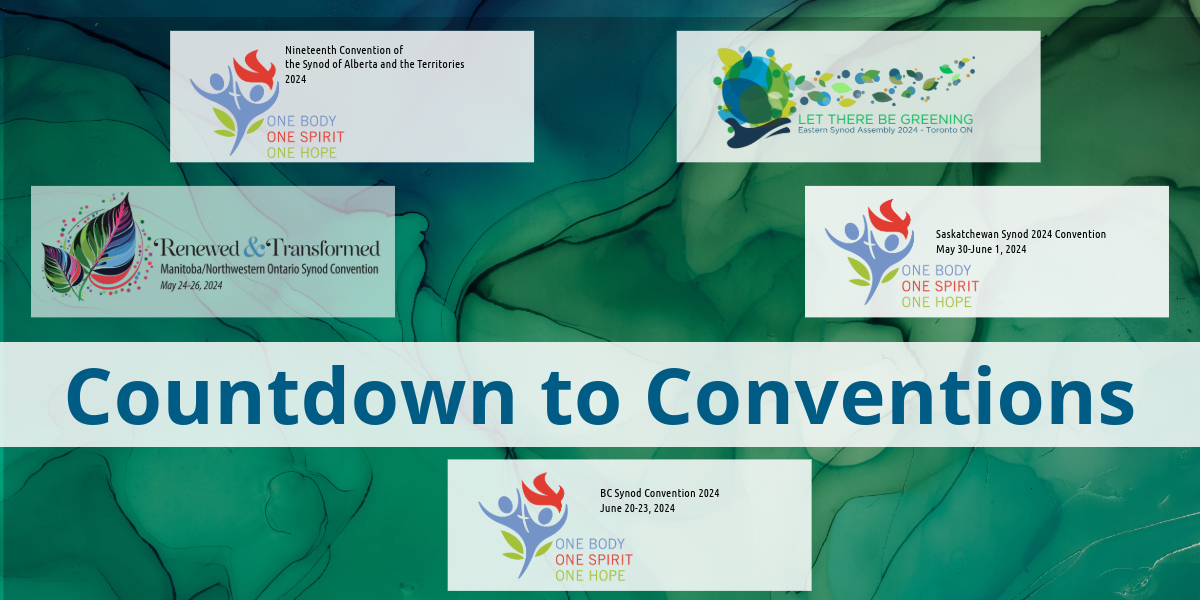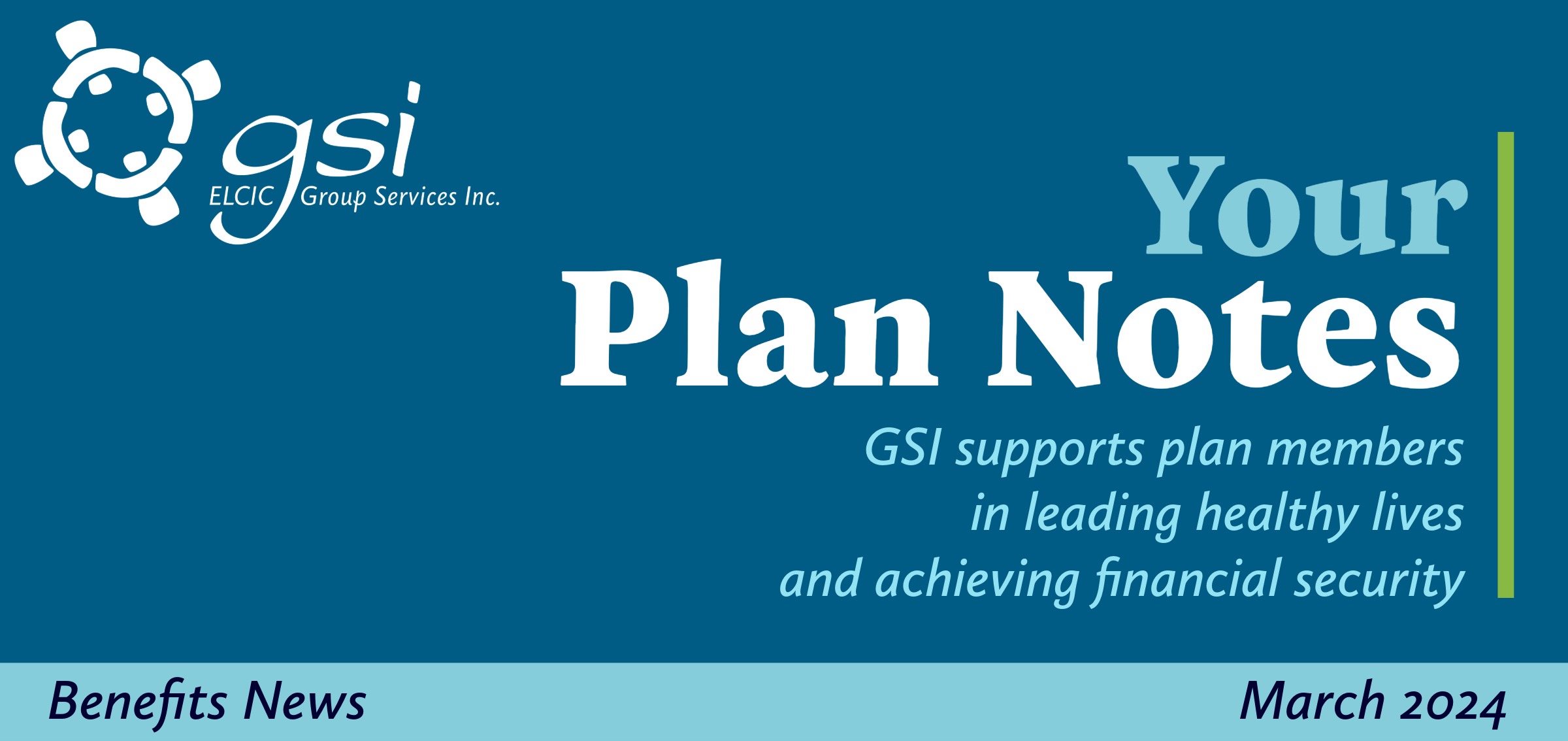
Taking a Medical Absence
“I am grateful for the Short-Term Disability (STD) benefit through my ELCIC Group Benefits Plan for assisting me through a difficult period and not adding extra stress or responsibilities during my period of illness.
I was pleasantly surprised when the application process for STD was fast and efficient. Neither my employer nor I struggled financially during my leave.
Thank you, GSI, for this benefit!”
–Rostered Plan Member‡
When the GSI Office received this appreciative note from a Plan Member who used the Short-Term Disability (STD) benefit of the ELCIC Group Benefits Plan, we were reminded that it’s been a while since we last wrote about this benefit in the GSI newsletter. A 2023 Benefits Canada Health Survey found that only 43% of workplaces in Canada report having this benefit. We in the ELCIC are fortunate to have it! Employers who don’t have STD expect their employees to apply for the disability benefit under the government Employment Insurance or to use their sick (or vacation) days.
STD is not something that people use often, so if you’re not sure what steps would be required should you need a medical absence from your employment, you’re not alone. The GSI Office is always happy to help you figure out what your benefits are and how to access them. It’s also a good idea to review the Plan information on the GSI website now and then to make the best use of your available benefits.
When a medical event occurs, you may experience additional anxiety and not know what to do. Here is some information that may help you understand when and how to use this particular benefit. We hope that knowing the steps will help provide peace of mind so that if you find yourself needing to take a medical absence, you will be able to focus on getting well rather than worrying about paperwork and income.
What is the purpose of STD?
Your Plan provides financial support if you are unable to work due to illness or injury. We attend to this program in a caring and compassionate manner and strive to minimize the stress to you in navigating the application process. It is important to use your Plan to support your wellness and enable you to be productive at work.
About the Benefit
On approval, the Plan will reimburse your Employer for 70% of your pre-leave Salary. Your Employer will continue to administer your pay at the new rate and make all the normal statutory deductions.
Your ELCIC Pension Plan contributions will continue based on the new pay, and your ELCIC Group Benefits Plan will also continue.
The Plan kicks in after a two-week medical absence. During that time, please look to the Sick Time Policy in the National Compensation Guidelines.
This Benefit is available for a maximum of 15 weeks after the initial two-weeks. If you are not able to return to work after the 15 weeks, GSI will reach out with information on the process to apply for Long-Term Disability about six weeks before the transition.
Early Notification Is Key
It’s vital to talk to your physician and start the process as soon as you can to promote your health and avoid any delay in your pay while waiting for approval. That means if you have a surgery scheduled that is likely to require time off work, you can contact GSI when you know the date. Likewise, if you develop a serious illness that seems like it may not be resolved in two weeks, please let us know! We won’t feel like our time was wasted preparing for a medical absence that ended up not being necessary. It’s better to prepare just in case.
The Steps
Steps to Apply
Here are the steps to follow when, for medical reasons and on the advice of your physician, you are not able to work.
- First, report your absence to your Employer,* saying that you are unable to work for medical reasons on the advice of your physician. You should also advise them of your expected length of absence and possible return to work date, if known.
- Your Employer will then contact GSI, and we will start your claim. GSI will send information to you and your employer about the Plan and the process. If you would also like to discuss your absence with GSI and have questions, please call or email us. We are here to assist you.
- Next, you will be contacted by Windley Ely, an independent company specializing in medical absences. All your communications with Windley Ely are confidential. They will talk to you about your absence and provide forms for you and your physician that will need to be completed.
- After reviewing the medical support provided by your physician, Windley Ely will advise your Employer and GSI of their recommendation for approval. If more information is needed to approve the claim, they will let you know what is missing.
*Your “Employer” may be your Council Chair or designate.
Steps Once Approved
- You are expected to actively follow any treatment recommendations while receiving the Benefit from the Plan. We encourage you to participate in seeking rehabilitation supports to bring you back to good health.
- After an approval is granted, updated medical information is typically required after a set time period, unless you are to return to work at that time.
Getting Back to Work
The goal of the Plan is to support your successful return to work when you are medically able to do so.
- In some cases, an accommodation, determined by your physician, may be needed. Windley Ely will review this and communicate it to your Employer to determine its feasibility.
- Some medical situations require a gradual return to work. This means that you may come back with reduced hours for a period until you can sustain a full return to your normal hours. Your physician will outline the schedule, and Windley Ely will communicate that to your employer.
‡This was written by a real plan member. We've printed parts of their note anonymously — with their permission — because Plan Members' medical information is confidential.

Support and Direction through Life Coaching
Pastors Kimber McNabb and Paul Gehrs share how life coaching has helped in their ministry and vocation
Kimber's Story
Resurrection Lutheran Church in Halifax is in the process of discerning its future. Everything is on the table, and many options are being investigated.
With Continuing Education Plan (CEP) money, I was able to get support and direction from a clergy coach: five one-hour-long sessions that included specific identified areas to reflect on and followed by homework.
The clergy coach helped me articulate where I am as a pastor in conversations of redevelopment and supported me through leading church council as they lead the congregation.
Clergy coaching helped:
- lower my anxiety,
- process each step of a plan,
- articulate needs and wants, and
- support me in the work being done.
This link explains what clergy coaching is and outlines the Eastern Synod’s encouragement for clergy to access it: https://easternsynod.org/clergycoaching/
Paul's Story
My Be Mindfully Well coaching sessions are Enneagram-based, with a key focus on being in touch with what is happening in my head, heart and gut.
I have used the one-on-one time to:
- prepare for tense meetings,
- navigate difficult interpersonal relationships,
- get unstuck from complex projects,
- deal with uncomfortable moments, and
- do vocational discernment.
I find that coaching helps me to see the options I have for addressing challenges. It also lets me appreciate the great cloud of witnesses/colleagues who are making the ministry journey with me. Coaching has enabled me to move from judgement to curiosity.
By helping me to feel more grounded, coaching prepares me to be more present in the moment and to react in healthier ways to stressful, frustrating, or surprising situations.
To be eligible for CEP funding, the Life Coach must be certified. The coaching also has to be related to the Plan Member's employment. GSI can help you determine in advance whether coaching that you wish to pursue will be covered under your CEP funds.

Are Your Beneficiaries Up-to-Date?
Recently, I listened to an interview on a news show where they recommended reviewing your will every three to five years. It got me thinking about what else should be checked in connection with this idea. What immediately came to mind is the beneficiaries on the group life insurance.
Back in January, GSI sent out the ELCIC Pension Plan statements, which list the beneficiaries for your pension account; in the cover note, members were asked to review those. It’s important to be aware that those names do not need to be the same as those whom you selected to have as beneficiary/ies on your life insurance. You may not have reviewed your choice since you first enrolled in the Plan.
Especially if you have experienced a life event — such getting married or divorced, children becoming adults, or the death of a spouse — you might want to take a moment to check who you have named and whether that still makes sense.
Please contact the GSI Office if you would like a memory refresh on who your life insurance beneficiary is, and we will let you know. If you would like to make a change, you can complete this form from our website, or we can send it to you.
A couple of points that may be of interest:

- the entitlement of any beneficiary who predeceases you will revert to your surviving beneficiaries in equal shares — not the heirs of the deceased beneficiary
- you may designate a contingent beneficiary/ies to receive any proceeds if all the primary beneficiary/ies named should die before you. Contingent beneficiaries do not receive any entitlement if there is a surviving primary beneficiary.
- if there is no surviving beneficiary and if you have not named a contingent beneficiary or the contingent beneficiary is also deceased, then your estate becomes the contingent beneficiary
If you are wondering who you should name, consider who would suffer the most financially if you were not here. If no one is financially connected to you, then you could name someone (or a registered charity) who is important to you.

March Webinar: Sleep and Insomnia
Sleep plays a pivotal role in maintaining cognitive function, emotional well-being, and overall physical health. A lack of sufficient, restorative sleep can lead to a multitude of challenges, including heightened stress levels, increased anxiety, and depression, significantly affecting your day-to-day life. Learn more about sleep in the full March HumanaCare newsletter.
Join clinical psychologist Kayleigh-Ann Clegg for this month’s expert webinar. In it, we will explore how to navigate the intricacies of sleep issues and offer practical solutions to improve your sleep quality and enhance your overall health.
 The question addressed in the webinar is:
The question addressed in the webinar is:
“Recently, I’ve noticed a significant increase in difficulty falling asleep and staying asleep. It’s starting to impact my daily life and overall well-being. What can I do?”
Date: Wednesday, March 20
Time: 12:00 – 12:30 pm ET
As always, the webinar will be recorded. You’ll be able to access the recording through the registration button below.
Interested in the entire March HumanaCare newsletter, which has additional information about sleep? You can access it here.

GSI at Your Synod Convention/Assembly in 2024
2024 is to be a summer of Synod Conventions/Assemblies, and GSI will be there! Staff and Board Directors are planning to be present and are looking forward to meeting you and other Plan Members there.
 As part of our ongoing effort to promote wellness in the ELCIC, we anticipate having a HeartMath practitioner at our display. The HeartMath Institute has done research to show how heart rate variability (HRV) is tied to your health, your biological age, and your stress levels. Using special equipment, the practitioner will be able to measure your HRV and explain what this tells you about your health and emotions.
As part of our ongoing effort to promote wellness in the ELCIC, we anticipate having a HeartMath practitioner at our display. The HeartMath Institute has done research to show how heart rate variability (HRV) is tied to your health, your biological age, and your stress levels. Using special equipment, the practitioner will be able to measure your HRV and explain what this tells you about your health and emotions.
Plan Members are invited to swing by the display whether or not they are delegates to the convention/assembly.
Learn more about the science of HeartMath on the HeartMath Institute’s website.

Have a Question for GSI?
We welcome your questions and feedback!
Information and resources can also be found on the GSI website.
GSI Website: elcicgsi.ca
Winnipeg Residents: 204-984-9181
Toll Free: 1-877-352-4247


